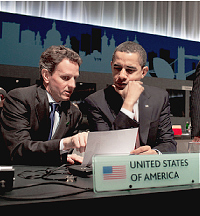| Taking Stock of the Obama Revolution |
 |
|
By Troy Senik
Thursday, August 27 2009 |
During a press conference at April’s G-20 Summit in London, President Obama said, “I'm the President of the United States … so I have a direct responsibility to my constituents to make their lives better. That's why they put me in there. … And I will be judged by my effectiveness in meeting their needs and concerns.” With the President’s allies in Congress and the media savaging his opposition as everything from racists to corporate shills in recent weeks, perhaps it’s time that Obama rediscovers this standard. As he vacations on Martha’s Vineyard this week, the President should take stock of whether the growing opposition to his administration stems from how he has met the American people’s “needs and concerns.” Foremost in most Americans’ mind is the economy. If anything can be said to define Obama’s policy mandate, it is the wheezing marketplace he inherited upon taking office in January. Yet Obama’s policy prescriptions have often seemed like the answer to a question that no one asked. First there was the stimulus package, a nearly $800 billion government investment in disproving the efficacy of nearly $800 billion government investments. Passed without being read, and spent on everything from state budgets to San Francisco sex shows (the two most immoral exercises in American life), the stimulus has become a vehicle for evasion. With its cash injection failing to lift the market’s spirits, administration officials now claim that it was only intended as a mild palliative, not a recipe for recovery. With unemployment soaring beyond rates that the stimulus was supposed to preclude, its supporters now argue that its only defect was not being large enough. And with virtually no visible progress emanating from the plan’s implementation, the President is left arguing that conditions would have been worse if it hadn’t been passed – an argument convenient for its lack of verifiability. The stimulus – combined with Obama’s shore-leave spending habits – has also birthed a growing concern about the nation’s long-run financial health. This week, the White House budget office estimated that the country will run a $9 trillion budget deficit over the next decade, with the national debt reaching three-fourths of the nation’s entire economy by the end of that period. At the same time, the nation’s entitlements are sputtering towards insolvency and the Federal Reserve’s injection of trillions of dollars into the marketplace leaves the specter of runaway inflation hanging over the marketplace. In a grim irony, an economic crisis that owes much to the profligate ways of Fannie Mae and Freddie Mac is being compounded by a federal government that is now emulating those firms’ fiscal incontinence. Any president who understood that the first function of his office is to meet the challenges of the hour would place his domestic focus solely on combating this basket-case economy. But Obama is a man insistent on having history meet him at a time and place of his choosing. Thus, he has incomprehensibly advanced an agenda that – while gratifying his ideological fetishes – works to actively impede recovery. He proposes a $1 trillion health care plan that would move America towards the socialized systems of Canada or Great Britain while conveniently ignoring that the failures of that model are driving both countries toward market-based reforms. And he lobbies for a cap-and-trade bill that will suck an average of $400 billion a year out of the American economy without having any substantial effect on climate. If Obama offered more robust leadership abroad, some of his stateside sins might be forgiven. But such has not been the case. He refused to say a word on behalf of democratic protestors in Iran while enthusiastically supporting a Honduran president who sought to shred his country’s constitution. He offered to barter away the missile defenses of Eastern Europe while heaping praise on the autocrats of Russia. He twisted the arms of America’s allies in Israel while comparing the travails of women in Islamic countries to those of the fairer sex here in the United States. When he goes abroad, he stays silent on freedom and democracy. Instead, his watchwords are “stability” and “respect.” But there are plenty of stable dictatorships in the world. And respect is only meaningful if it is earned. Obama still has about 85 percent of his term ahead of him. But thus far his is not a record to be proud of. Is he correct to note that he will be judged by his effectiveness in meeting the needs and concerns of the American people? We can only hope so. |
Related Articles : |
























